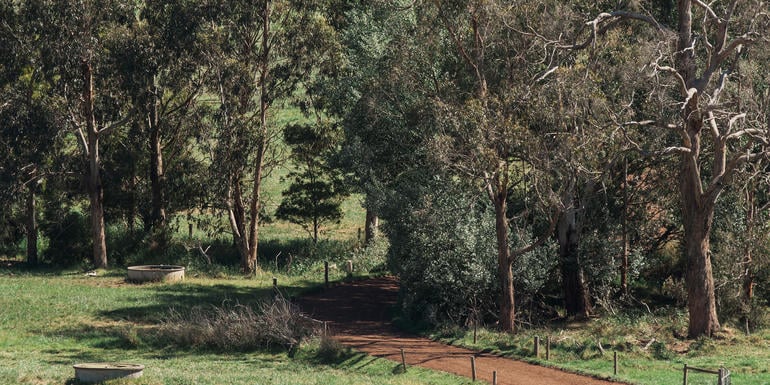Aboriginal Deakin graduates developing deadly bush kinder programs
Deakin newsThis article originally appeared on The Australian Children’s Education and Care Quality Authority (ACECQA) blog, We Hear You.
Rhonda Livingstone, ACECQA’s National Education Leader, speaks with Tina Thompson, Koori Preschool Assistant at Berrimba Child Care Centre in Echuca, Victoria about their bush kinder program
Every Monday at Berrimba Child Care Centre, children aged three and above are taken into the bush for a three hour program of exploring and activities. These visits provide opportunities for children to connect to the land, live their culture and explore nature, as well as scientific and maths concepts.
Tina Thompson, Koori Preschool Assistant at the service, says the program fits well under the Belonging, Being and Becoming: The Early Years Learning Framework by linking with the five learning outcomes identified.
Tina spoke to me about the smoking and Welcome to Country (in language) ceremonies that educators and children collaboratively participate in to recognise the traditional owners and to cleanse their spirits. She talked about the valuable opportunities for children as they play and explore in the bush, giving time to leave behind any troubles they may be experiencing. Tina explained how “children need to know their culture, identity and be strong and proud, knowing and valuing their rich culture”.
Science is a feature of these excursions into the bush with lots of discussion about the natural creations. For example, children were fascinated with the drying mud; Tina laughingly reported that children, at first, thought it was chocolate. The children talked and theorised about where the water goes. “It is really important to get our culture back and being out in bush kinder is a great way to connect with the ancestors and to thank Mother Nature for all the beauty around us,” said Tina.
An example of an effective learning experience occurred when children at the service learned how to make a canoe under the guidance of Uncle Rick, an esteemed Aboriginal elder and strong male role model in the community. Educators take iPads to record the rich learnings, and share these with families and others in the community. “Children are learning about sustainability. Aboriginal people for generations have only taken what they needed; it is important for children to learn to respect and care for nature and follow in the footsteps of their ancestors,” she added.
Last year, the children made a humpy (a shelter) in this beautiful natural environment. The educators were available to help and guide but the initiative, ideas and problem solving came from the children. “They are amazing,” Tina noted, explaining how they cooperatively gathered the sticks and worked out how to build it so it would stay up. During each visit, they would add to the structure, help each other, and play in and use it in a variety of ways, allowing each other space to explore, work and play.
“We might turn over a log and study the bugs, but we don’t take them away,” she said. “We talk about our totems and why we don’t eat our totem. We don’t take the bugs, insects, stones, sticks or anything we find, just study them and marvel in the beauty of nature.”
“We have a lot of strong leaders in our community and children in our service are showing skills that will make them great community leaders of the future, leaders who can advocate and fight for the needs and rights of our people. The children are teaching their parents and family members.”
The identified benefits of the bush kinder include:
- increasing evidence that children’s inner wellbeing is benefitted by being outdoors as the natural environment enhances their health, learning and behaviour by supporting personal and social development, as well as physical and mental health
- the sense of calm and restoration gained from spending time in the bush
- providing children with a connection while they are young, and the hope they will build a sense of belonging and respect for the country as they grow.
Back at the service, educators can regularly be observed putting ochre (traditional Aboriginal body paint) on the young children and babies, and singing songs in language and dancing along. Tina pays respect to her colleagues, and Deakin University graduates, Leona Cooper (jokingly called Boss Lady) and Joyce Ward, two women strong in their culture and relentless advocates for their families and community. These women work long and hard to ensure no child falls through the cracks and to advocate for these opportunities to continue to enrich the lives of children in the Echuca community.
To finish, Tina draws my attention to a quote from Jenny Beer (from the Aboriginal language group Wergaia):
“…if we don’t learn our language, then our kids, in future generations will be like us, looking for our identity, going through that identity crisis.”
Learn more about the Institute of Koorie Education
Further reading and resources
Nyernila – Listen continuously: Aboriginal creation stories of Victoria
Forever Learning – A digital story from Berrimba Child Care Centre
Share this story

